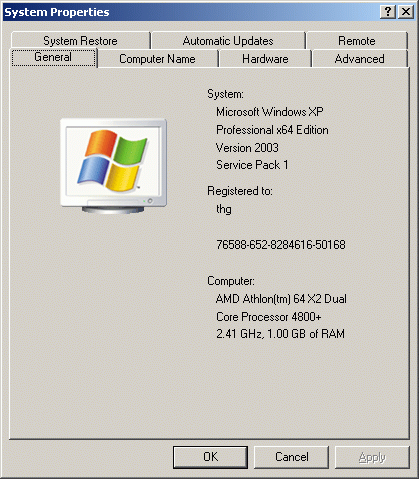Windows XP x64, Promise and Reality
AMD Vs. Intel - 64 Bit Support
Both AMD and Intel have processors with 64 bit capability today. However, credit for this advance belongs to AMD, since the Athlon 64 family has been ready since its introduction almost two years ago. In contrast, Intel did not see the necessity for 64 bit computing in the desktop mainstream until the beginning of this year.
Right now, all AMD Athlon 64 and certain Intel desktop chips for socket 775 are 64 bit ready. These include:
- Pentium 4 630 to 670
- Pentium D 820, 830, 840
- Pentium Extreme Edition (dual core)
- Celeron D 326, 331, 336, 341, 346, 351, 355
While only the Mobile Sempron is not ready for 64 bits, Intel will not transition its notebook processors to 64 bits any time soon, simply because the architecture is not yet ready. We expect the Yonah processor architecture - both the single core 7x6 series and the dual core product, likely the 800 series - to hit the market in early Q1/2006, and the 64 bit enabled version called Merom to follow as it is required by the market.
64 Bit Processor Modes
AMD's Athlon 64 runs in legacy mode when using 32 bit Windows; the x86 64 extensions are not used. Using a 64 bit OS will cause an AMD64 processor to run in 64 bit Long Mode, while Intel chips will enable IA32e mode. Both of course are the same, because Intel is using AMD64 technology thanks to a cross-license agreement with AMD.
Long Mode knows 64 bit native instructions and has a compatibility submode, the latter making the chip binary compatible with 16 bit and 32 bit applications. Even if it does not make much of a difference today, the physical address space is limited to 52 bits (AMD) or 40 bits (Intel) right now. However, this should not be a disadvantage any time soon because 40 bits are enough to address 1 TB (teraByte) or 1024 GB of RAM.
More details about 64 bit support can be found here:
Get Tom's Hardware's best news and in-depth reviews, straight to your inbox.
Current page: AMD Vs. Intel - 64 Bit Support
Prev Page Who Needs 64 Bit Windows? Next Page Test Setup
Patrick Schmid was the editor-in-chief for Tom's Hardware from 2005 to 2006. He wrote numerous articles on a wide range of hardware topics, including storage, CPUs, and system builds.
-
mr roboto Woah there's a 64 bit Windows now? What's next 128 bit versions. As I'm still rocking my 8 bit NES.Reply -
oneof10 Thank you for the article. Though this article may seem outdated and therefore fairly irrelevant, I just happened upon a free copy of XP 64 and was exploring the value in dual booting my XP 32 system. Thanks for saving me a potential headache for very little benefit.Reply -
I found some newer games that would not work on Win7 (and fyi, Win7 XP mode is *not* for gamers, no 3D graphics) so I dual booted with WinXP x64. Thankfully I had a great system driver disk, though at this time availability of 64 bit drivers is not the issue it used to be.Reply
But ... lemme say WinXP x64 ROCKS ... I was getting some butter-smooth frame rates with every video setting max'd. Yeah, I know there's multicore CPU, a GPU, chipset, etc. in the picture ... but just a gut check tells me that data is *flying* in there, even if it is 32 bit code. The OS overhead must be much less or something. -
bakra downloads what i learned today is not to trust idiots at tomshardwareReply
windows xp 64 bit is godlike
it's performance is mind blowing
I would pay money to anybody who can get me a windows xp 64 working on newer hardware (like HP laptops)
newer hardware only supports windows 7 64
windows 7 64 is nothing when u compare it to windows xp 64
dunno why it is so "butter smooth" and fast. I speculate win xp 64 less drivers (eg. hibernation is not supported) thus less DPC processing and more butter smoothness
